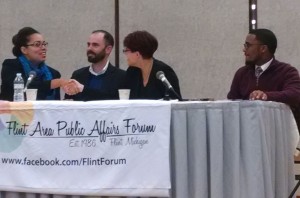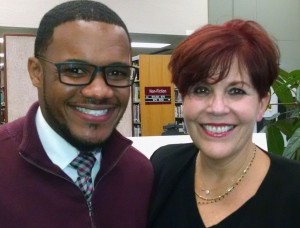Mary Jo Finney, Ph.D, UM-Flint Education Department Chair, and UM-Flint Education alumnus JaNel Jamerson joined a panel October 13 at the Flint Public Library that sparked a community discussion concerning low literacy levels among children and young adults in Flint.

Dawn Demps, Paul Joice, Mary Jo Finney and JaNel Jamerson participate on a literacy panel Oct. 13, 2015 at the Flint Public Library.
Organized by the Flint Area Public Affairs Forum and moderated by Isaiah Oliver, President of the Flint Community Schools Board of Education, the event posed the question “Does Reading Matter?” The panel also included Dawn Demps, Executive Director of The Urban Center for Post-Secondary Access & Success, and Paul Joice, Flint Team Leader for White House Strong Cities, Strong Communities Initiative.
Members of the panel discussed the research-based links between low literacy, poverty and low graduation rates, especially among young black and Hispanic populations. The event was part of a series of programs in response to the White House My Brother’s Keeper Community Challenge, established in 2014.
Oliver mentioned a number of statistics that link low literacy with low economic status and low graduation rates, including the statistic that one in four students who does not read at grade level by third grade is likely to drop out of school. Low literacy in grade school is also related to higher prison entry rates. “We want to see people grow to where they can be economically self-sufficient,” he said.
Increasing academic and economic opportunities begins with understanding the process of gaining literacy. “Quite simply, reading is a thinking event,” said Dr. Finney, discussing research showing that the process of language development in babies and young children is closely related to the frequency of parent-child communications. “It is a more complicated event than a decoding word process.”

JaNel Jamerson, UM-Flint Education Dept alum and Director of Flint & Genesee Literacy Network with Dr. Mary Jo Finney, Chair, UM-Flint Education Department
Dr. Finney, who specializes in reading and language arts, founded the UM-Flint Reading Center in 1998 to pair graduate students with local K-12 students needing individualized assistance with reading. On the panel, she explained that the UM-Flint Education Program prepares teachers to think about themselves and who they are as individuals in order to shape their skills to teach most effectively. Student teachers are also trained to focus on a child’s abilities and potential as lifelong learners.
A Flint native, Jamerson received his master’s degree in education from UM-Flint in May 2014. He credits the UM-Flint Education Program for fully preparing him as a teacher by immersing him in hands-on classroom teaching experiences from the start. Today he is the Director of Flint & Genesee Literacy Network, which serves as a platform for people to address problems in the community related to low literacy.
“We know that reading matters but there are still gaps in people’s literacy,” Jamerson said. “No one person or organization can solve these problems in our community. Literacy is a commitment that we all must make for life.”
